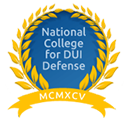

Drug Recognition Experts
When police officers suspect motorists of operating a vehicle under the influence of alcohol or drugs (OVI) in Ohio, they will usually have the alleged offender undergo a series of field sobriety tests and submit to a breath alcohol test to determine the level of impairment.
If an alleged offender exhibits symptoms of intoxication but the tests do not show a blood alcohol concentration (BAC) that violates state law, the police officer may call for a drug recognition expert or drug recognition evaluator (DRE).
DREs are a fairly recent development in Ohio, but many other law enforcement agencies around the nation have been using them for decades. In theory, a DRE is an officer who is specifically trained to determine whether an alleged offender is impaired by drugs and what kind of controlled substance.
Prosecutors generally love having DREs testify in court because the use of the term “expert” in their title implies a masterful understanding of illegal drug use. In many of these cases, the court will refer to the DRE as a “drug recognition evaluator” in front of the jury to avoid using the term “expert.”
Regardless of the terms used, the entire DRE process is extremely flawed and their observations and conclusions deserve further scrutiny.
Defense Lawyer for Drug Recognition Experts in Cincinnati
If you were arrested for allegedly driving under the influence (DUI) of controlled substances following an evaluation by a DRE in Cincinnati or the surrounding areas of Cincinnati, Ohio, then you need an experienced OVI defense attorney.
The Joslyn Law Firm defends clients accused of drugged driving throughout Cincinnati and surrounding communities in Hamilton County, Franklin County, Clermont County, Butler County, Clinton County, and Greene County.
Cincinnati OVI attorney Brian Joslyn is certified by the National Highway Traffic Safety Administration (NHTSA) as an instructor in the administration of standardized field sobriety tests. Call (513) 399-6289 today to have him review your case during a free, confidential consultation.
Overview of Drug Recognition Experts in Hamilton County
- When are DREs typically used in Ohio?
- What do DREs normally do when they are called to investigate a case?
- Where can I learn more about DREs?
Types of Ohio Cases That Might Involve Drug Recognition Experts
Not every police encounter in which a DRE is summoned begins as a suspected DUI offense. DREs may be called following many other types of common traffic offenses when a police officer suspects a driver is under the influence of a controlled substance.
Some other common alleged crimes for which a DRE may be used include, but are not limited to:
- DUI / OVI and Prescription Drugs;
- DUI / OVI and Marijuana;
- Vehicular Homicide / Manslaughter;
- Vehicular Assault;
- Fleeing and Eluding;
- Hit and Run;
- Minor in Possession of Alcohol;
- Possession of a Controlled Substance;
- Possession of Drug Paraphernalia; or
- Reckless Driving.
Drug Recognition Expert Protocol in Cincinnati
DREs undergo a three-phase training program that involves 72 hours of classroom training and passing numerous evaluations. When they enter the field, DREs use a 12-step protocol established by the International Drug Evaluation and Classification Program (DECP) to determine whether the alleged offender is impaired, whether any alleged impairment relates to drugs or a medical condition, and what category or combination of categories of drugs are the likely cause of the impairment.
The dozen steps of a typical DRE evaluation take roughly an hour to complete and include:
- Breath Alcohol Concentration (BAC) — Prior to a DRE being called, the police officer will have an alleged offender submit to a breath test. If the BAC exceeds the legal limits, the motorist is arrested for OVI without a DRE being called. If, however, the BAC is below the legal limit and the driver exhibits signs of impairment, the DRE is summoned.
- Interview of the Arresting Officer — The first step of the actual DRE investigation is a discussion of the circumstances with the police officer. The DRE will gather information about the alleged offender’s behavior, appearance, and driving in addition to asking specifically about any statements from the alleged offender regarding drug use and relevant evidence consistent with drug use.
- Preliminary Examination and First Pulse — In order to determine whether an alleged offender may be suffering from an injury or other condition unrelated to drugs, DREs ask alleged offenders a series of standard questions relating to their health and recent ingestion of food, alcohol and drugs, including prescribed medications. DREs also examine the pupils of alleged offenders, look for horizontal gaze nystagmus (HGN), and take the subject’s pulse for the first of three times. Medical assistance will be sought if a DRE believes the alleged offender is suffering from a medical condition, but the evaluation continues if the DRE believes that an alleged offender’s condition is drug-related.
- Eye Examinations — The DRE conducts HGN, vertical gaze nystagmus (VGN), and eye convergence tests on the alleged offender.
- Divided Attention Psychophysical Tests — The DRE administers four psychophysical tests, including the Romberg Balance, the Walk-and-Turn, the One-Leg Stand, and the Finger-to-Nose tests. Keep in mind that only two of these tests are standardized by NHTSA.
- Vital Signs and Second Pulse — The DRE takes the alleged offender’s blood pressure, temperature, and pulse.
- Dark Room Examinations — The DRE uses a pupilometer to estimate the alleged offender’s pupil sizes under three different lighting conditions.
- Examination for Muscle Tone — The DRE examines the alleged offender’s skeletal muscle tone.
- Check for Injection Sites and Third Pulse — DREs examine alleged offenders for injection sites and takes their pulse for the third and final time.
- Alleged Offender’s Statements and Other Observations — If not done so previously, DREs read alleged offenders their Miranda rights and ask a series of questions regarding their drug use.
- Analysis and Opinions of the Evaluator — The DRE forms an opinion as to whether the alleged offender is impaired and, if so, indicates what category or categories of drugs may have contributed to the impairment.
- Toxicological Examination — The DRE requests a urine, blood, and/or saliva sample from the alleged offender for a toxicology lab analysis.
The lengthy evaluation of a DRE is tainted by confirmation bias. The very first step for a DRE is to speak to the arresting officer, essentially making an unbiased evaluation from that point on impossible.
Additionally, the fourth, fifth, and 10th steps usually do little but repeat tests already performed by the police officer. Most other steps concerning the health of the alleged offender are best left to medical personnel who have more substantial training and a much better understanding of the conclusions that can be drawn from unusual physical symptoms.
Resources for Drug Recognition Experts in Ohio
The International Drug Evaluation and Classification Program (DECP) — The DECP was created following the collaboration of NHTSA with the Los Angeles Police Department (LAPD) after the LAPD developed a multi-step protocol and the first DRE program in the 1970s. On this website, you can learn more about the DRE program, including the seven categories DREs classify drugs into, upcoming events, and documents with information on the use of alcohol and drugs. You can also find newsletters and answers to frequently asked questions.
Ohio State Coordinator
Seargant Wes Stought
Ohio State Highway Patrol
1970 West Broad Street
Cincinnati, OH 43223
(614) 466-3078
The methodological quality of three foundational law enforcement drug influence evaluation validation studies — This paper published in the Journal of Negative Results in BioMedicine on November 4, 2013, identifies the scientific studies commonly cited in American criminal trials as evidence of the drug influence evaluation (DIE) accuracy of DREs. The research examines the accuracy of diagnostic tests and diagnostic research methodology, concluding that “the three validation studies commonly cited in American criminal prosecutions to quantify the accuracy of current US law enforcement DIE practice, did no reference testing of driving performance or physical or mental impairment, investigated tests different from those currently employed by US law enforcement, used methodologies that biased accuracies, and reported DIE accuracy statistics that are not externally valid. The LEDA accuracies reported by these studies do not quantify the accuracy of the DIE process now used by US law enforcement. These validation studies do not validate current DIE practice.”
Find a Lawyer for Drug Recognition Expert Cases in Cincinnati, OH
Were you arrested for alleged drugged driving or OVI after being evaluated by a so-called drug expert in Cincinnati, Ohio, or the surrounding areas in Central Ohio? If you have questions about the conclusions drawn by a DRE, give us a call. Hiring skilled legal representation to contest the result could help get your criminal charges reduced or possibly even dismissed.
Brian Joslyn is a Cincinnati criminal defense attorney who represents alleged offenders all over Hamilton County, Greene County, Clinton County, Butler County, Clermont County, and Franklin County.
You can receive a complete evaluation of your case during a free consultation as soon as you call (513) 399-6289 or submit an online form.























